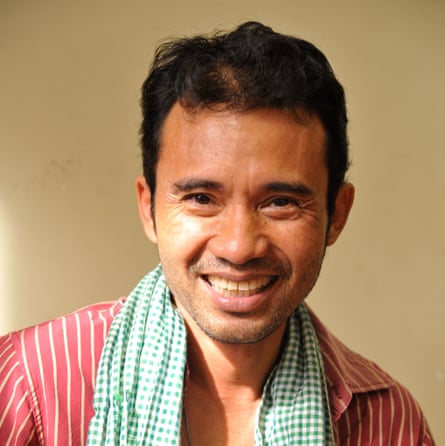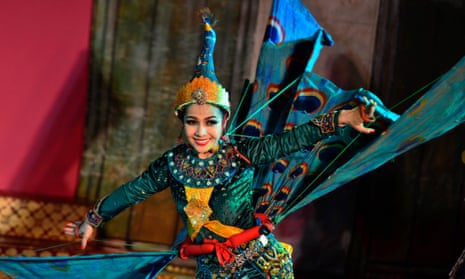Of all the ways to learn a musical instrument, Arn Chorn-Pond’s experience is one of the more unusual. When the ultra-communist Khmer Rouge regime seized Cambodia in 1975, he was spared the murder that befell 80-90% of the country’s artists and musicians, including his parents, who ran an opera group.
Instead, the cadres running his labour camp forced him to learn the flute to play propaganda songs that the regime would blast from speakers to dull the screams of victims as they were tortured and killed.
“I was forced to witness a lot of killing – three or four times a day. I was forced to push people into the grave and take off their clothes while they stuck a bayonet into them,” he said.

Pond, having survived Pol Pot’s genocide that killed one-third of the population between 1975 and 1979 and the invasion of Cambodia by Vietnam during which he became a child soldier, now dedicates his life to reviving the country’s cultural heritage.
Cambodian Living Arts (CLA), the NGO he set up in 1998 to reconnect surviving artists, is thriving and offers community arts programmes, arts education scholarships and promotes a fair wage for the country’s performers. He recently spoke at a TEDx talk at Warwick University. His speech, his first in the UK, was entitled Music Saved My Life. He told the audience about his life and performed both a Khmer Rouge song and a Cambodian lullaby. There was a standing ovation, though by that point he’d left the stage, overcome with emotion.
Pond’s relationship with music is inextricably linked to his past suffering. He is convinced that music was essential to his survival of the Khmer Rouge regime. His teacher Master Mek taught him to play to a standard they approved of and begged the soldiers to keep him alive.
If he’d been slow to learn, he would have been killed. “Three boys out of five were slow to learn the instruments, and the Khmer Rouge killed them. I’m sure besides Mek, music is the reason I’m alive today.”
But Pond couldn’t escape violence for long: when the Vietnamese invaded in 1979 he was, like thousands of Cambodian children, given a gun and ordered to fight against them. He managed to escape into the jungle, where he lived off fruit, watching what the monkeys could eat, and, when desperate, ate the monkeys themselves. “I don’t know how many months I was there. I don’t know how I survived, because of the snakes and leeches. It seemed to last forever.”
Almost miraculously, he stumbled upon a refugee camp in Thailand. He had cerebral malaria, was adopted by the Rev Peter Pond and taken to the US, where he spent the rest of his childhood.
Pond has lived through significant trauma, but music has helped him to heal mentally, too: “I think the turning point for me was when I started to play music again. I played my flute for American kids and I saw the power of music: I played and it touched them somehow. It’s universal.”
Of the artists Pond found on returning to his homeland in the 1990s, perhaps the biggest and most poignant surprise was Master Mek. Pond found him in Battambang – his own hometown in north-west Cambodia – living on the streets. He was one of the original artists to join Pond in his project, which took off after he got significant funding from friends in the states.
But funding wasn’t the only challenge facing Pond as he set up CLA. Because so few of the country’s artists had survived, and old records and music sheets destroyed, he found a huge void in the country’s cultural heritage. Many young people were listening to international pop music, he said. “They were hip-hopping in Cambodia from all over the world. They were listening to Korean pop, American pop, rappers. People were looking outside instead of learning their own traditional music.”
There is a huge number of NGOs operating in Cambodia, in many cases running basic services. Many, including the academic Sophal Ear who wrote the book Aid Dependence in Cambodia: How Foreign Assistance Undermines Democracy, have criticised this landscape for enabling government corruption.
But that’s not a concern for CLA. “There is a lack of resources from the public side and many of the NGOs can help fill these gaps,” says executive director Phloeun Prim. “The ministry of culture has set up an arts and cultural policy, and the arts and cultural NGOs are responding by creating and implementing programming.”
Cambodia, still reeling from decades of conflict, is home to many problems. Forced evictions and deforestation is rife; last year Transparency International ranked the country the 20th most corrupt country in the world. With this in mind, why is it so important to revive the arts? “[Things like] hospitals are important to heal people physically,” said Pond. “But I think restoring the arts restores identity, restores dignity. We can bring people together in harmony, in peace.”
Join our community of development professionals and humanitarians. Follow@GuardianGDP on Twitter.

Comments (…)
Sign in or create your Guardian account to join the discussion